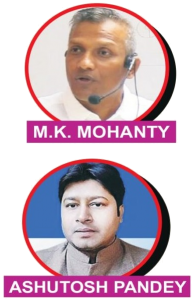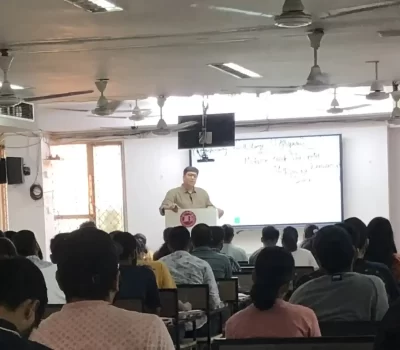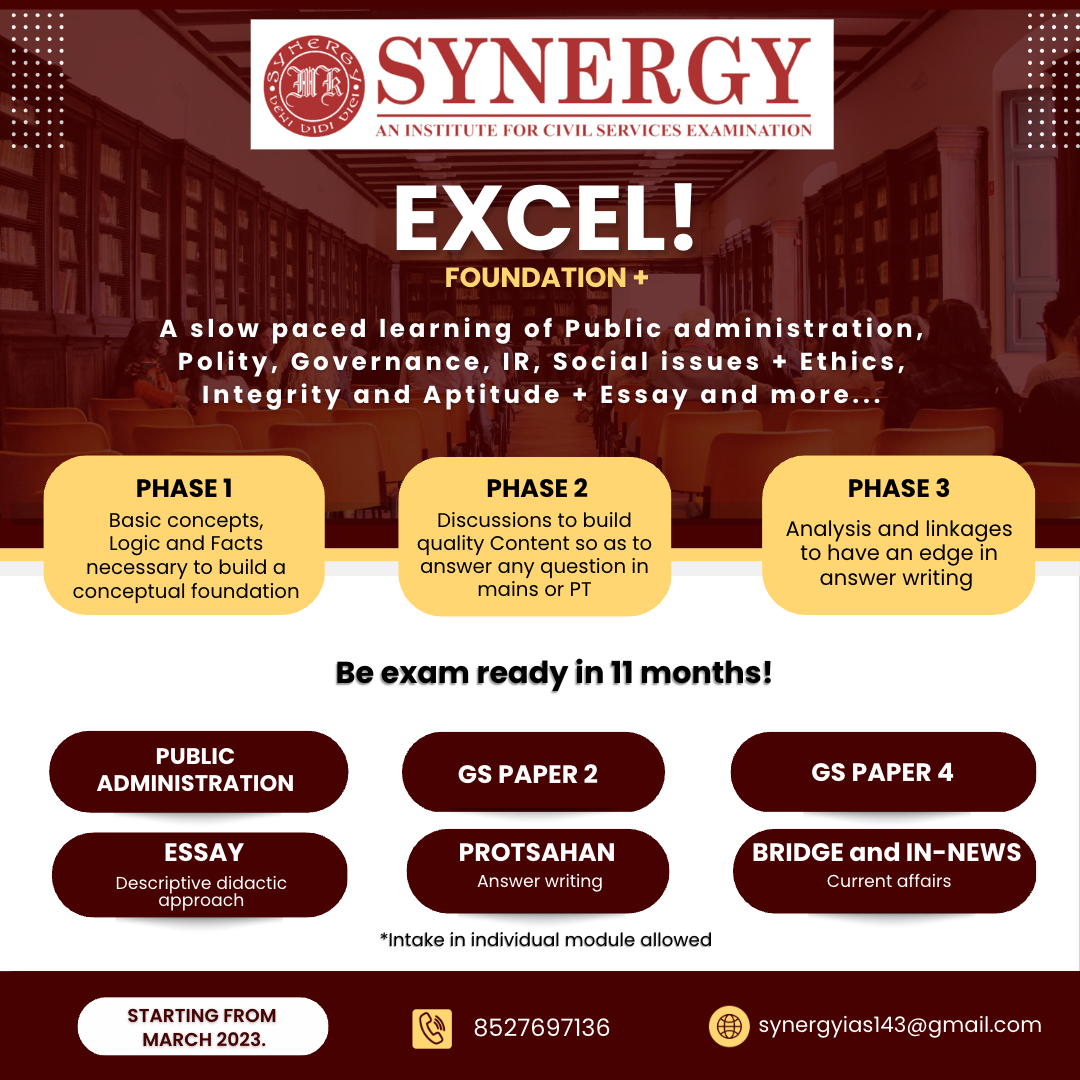PUBLIC ADMINISTRATION SYLLABUS 2022
Live Online/Offline Classes by : M.K. Mohanty & Ashutosh Pandey
- New Batch Starting from 27th OCT 2022
- Course Duration: 5 Months
- No Class is Pre-recorded
- Timing: 4:00PM - 6:30PM (MON-SAT)
- Fee: ₹53,100
Sign Up to Score High Better Faster


About Public Administration Course
Public Administration is one of the optional subjects in the UPSC Civil Services Main Examination. It is one of the popular choices because of its relevance in the job role of an IAS officer. This subject introduces the candidates to the mechanism of public administration which is surely of great use for future administrators. Further, it is one of the concept-intensive subjects. So, if you’re not that good in cramming, this subject is for you as it largely entails conceptual understanding.
Moreover, availability of resources and ease of understanding of the subject is also the factors that persuades aspirants to choose this optional subject. However, candidates opting for this subject must be cautious of writing generic answers as this subject is highly competitive. A lot of aspirants opt for this subject, hence make sure your answers stand-out to secure high marks in the examination.
Public Administration Course Highlights

5 Months Comprehensive Classes

Complete UPSC Syllabus of Public Administration

Coverage of Paper 2 through 2nd ARC based issues and current perspectives, including various journals.

6 Class Test - 3 Test in Paper 1 and 3 Tests in Paper 2

Comprehensive study material along with IIPA notes, 2nd ARC Gist and relevant articles that are in contemporary debate.

Discussion of previous year UPSC Question Papers

Discussion of most important Areas for Mains 2022

Innovative methodology, through the study of approaches for Paper 1 & Paper 2

Revision workbook for comprehensive understanding and answer writing skill development
Public Administration Syllabus
Paper 1: Administrative Theory
Introduction | Meaning, scope and significance of Public Administration; Wilson’s vision of Public Administration; Evolution of the discipline and its present status; New Public Administration; Public Choice approach; Challenges of liberalization, Privatisation, Globalisation; Good Governance: concept and application; New Public Management |
Administrative Thought | Scientific Management and Scientific Management movement; Classical Theory; Weber’s bureaucratic model – its critique and post-Weberian Developments; Dynamic Administration (Mary Parker Follett); Human Relations School (Elton Mayo and others); Functions of the Executive (C.I. Barnard); Simon’s decision-making theory; Participative Management (R. Likert, C. Argyris, D. McGregor). |
Administrative Behaviour | Process and techniques of decision-making; Communication; Morale; Motivation Theories – content, process and contemporary; Theories of Leadership: Traditional and Modern. |
Organizations | Theories – systems, contingency; Structure and forms: Ministries and Departments, Corporations, Companies, Boards and Commissions; Ad hoc and advisory bodies; Headquarters and Field relationships; Regulatory Authorities; Public-Private Partnerships |
Accountability and control | Concepts of accountability and control; Legislative, Executive and Judicial control over administration; Citizen and Administration; Role of media, interest groups, voluntary organizations; Civil society; Citizen’s Charters; Right to Information; Social audit |
Administrative Law | Meaning, scope, and significance; Dicey on Administrative law; Delegated legislation; Administrative Tribunals |
Comparative Public Administration | Historical and sociological factors affecting administrative systems; Administration and politics in different countries; Current status of Comparative Public Administration; Ecology and administration; Riggsian models and their critique |
Development Dynamics | Concept of development; Changing profile of development administration; ‘Anti development thesis’; Bureaucracy and development; Strong state versus the market debate; Impact of liberalization on administration in developing countries; Women and development – the self-help group movement. |
Personnel Administration | Importance of human resource development; Recruitment, training, career advancement, position classification, discipline, performance appraisal, promotion, pay and service conditions; employer-employee relations, grievance redressal mechanism; Code of conduct; Administrative ethics. |
Public Policy | Models of policy-making and their critique; Processes of conceptualization, planning, implementation, monitoring, evaluation and review, and their limitations; State theories and public policy formulation |
Techniques of Administrative Improvement | Organization and methods, Work study and work management; e-governance and information technology; Management aid tools like network analysis, MIS, PERT, CPM. |
Financial Administration | Monetary and fiscal policies; Public borrowings and public debt Budgets – types and forms; Budgetary process; Financial accountability; Accounts and audit. |
Paper-II: Indian Administration
Evolution of Indian Administration | Kautilya’s Arthashastra; Mughal administration; Legacy of British rule in politics and administration – Indianization of public services, revenue administration, district administration, local self-government |
Philosophical and Constitutional framework of government | Salient features and value premises; Constitutionalism; Political culture; Bureaucracy and democracy; Bureaucracy and development |
Public Sector Undertakings | The public sector in modern India; Forms of Public Sector Undertakings; Problems of autonomy, accountability, and control; Impact of liberalization and privatization |
Union Government and Administration | Executive, Parliament, Judiciary – structure, functions, work processes; Recent trends; Intragovernmental relations; Cabinet Secretariat; Prime Minister’s Office; Central Secretariat; Ministries and Departments; Boards; Commissions; Attached offices; Field organizations. |
Plans and Priorities | Machinery of planning; Role, composition and functions of the Planning Commission and the National Development Council; ‘Indicative’ planning; Process of plan formulation at Union and State levels; Constitutional Amendments (1992) and decentralized planning for economic development and social justice |
State Government and Administration | Union-State administrative, legislative and financial relations; Role of the Finance Commission; Governor; Chief Minister; Council of Ministers; Chief Secretary; State Secretariat; Directorates. |
District Administration since Independence | Changing role of the Collector; Union state-local relations; Imperatives of development management and law and order administration; District administration and democratic decentralization |
Civil Services | Constitutional position; Structure, recruitment, training and capacity-building; Good governance initiatives; Code of conduct and discipline; Staff associations; Political rights; Grievance redressal mechanism; Civil service neutrality; Civil service activism |
Financial Management | Budget as a political instrument; Parliamentary control of public expenditure; Role of finance ministry in the monetary and fiscal area; Accounting techniques; Audit; Role of Controller General of Accounts and Comptroller and Auditor General of India |
Administrative Reforms since Independence | Major concerns; Important Committees and Commissions; Reforms in financial management and human resource development; Problems of implementation. |
Rural Development | Institutions and agencies since independence; Rural development programs: foci and strategies; Decentralization and Panchayati Raj; 73rd Constitutional amendment. |
Urban Local Government | Municipal governance: main features, structures, finance, and problem areas; 74th Constitutional Amendment; Globallocal debate; New localism; Development dynamics, politics, and administration with special reference to city management. |
Law and Order Administration | British legacy; National Police Commission; Investigative agencies; Role of central and state agencies including paramilitary forces in maintenance of law and order and countering insurgency and terrorism; Criminalisation of politics and administration; Police- public relations; Reforms in Police. |
Significant issues in Indian Administration | Values in public service; Regulatory Commissions; National Human Rights Commission; Problems of administration in coalition regimes; Citizen-administration interface; Corruption and administration; Disaster management |
Features of Public Administration Course

Structured Courses

High Success Rate

India's Best Faculty


Classroom & Online Classes

15+ Years of Trust

3000+ Results
Our Toppers








Testimonials
Few of Our Achiever’s and Their Feedbacks


FAQ's on Public Administration Course
Creativity quotient analysis is a method of understanding how a student interprets a particular topic. It helps in developing an interrelated approach to understanding the difficult topics in the syllabus, as questions in public administration are quite hidden and camouflaged it becomes important to understand their various dimensions and then deal with the core issue of the question.
It is mains 2022 specific course designed for all those appearing with public administration as an optional and are willing to revise and value add the complete syllabus in an integrated manner.
Public Administration is pragmatic in nature dealing also with Indian Administrative System, which facilitates the success of candidates at each and every stage of examination, that is, Preliminary, Mains and Interview. As compared to other social sciences, humanities, Public Administration is more dependable and manageable within a specified time period subject to the condition that a systematic approach is adopted during the course of preparation to meet the requirements of the examination.
(a) The syllabus comprises of two papers, but it is never desirable to prepare the two papers separately. The integrated approach to the completion of syllabus is always desirable. This saves time and provides in-depth understanding of the subject matter in a realistic manner.
(b) The main examination is generally considered to be highly subjective in nature. But through objective preparation the zone of subjectivity can be reduced to a great extent.
(c) Conceptual topics, like Theories of Administration, Administrative Behaviour, Comparative and Development Administration, require extra effort but are scoring at the same time.
(d) Comments, statements and observations by eminent thinkers, scholars and administrators should be analysed with due emphasis to grasp their substantive meaning.
On completion of the textual readings, writing practice is must. Try to attempt the answers in an orderly, effective and exact expression, combined with due economy of words. In comment type questions your attempt should be to answer well within the prescribed limits. For medium and long questions the answers should be written in about 300 and 500–700 words respectively. To conclude, it can be suggested that the consultation of authentic standard reference books is crucial in the success-oriented preparation of Public Administration.
PA is the only subject in which almost all the students choosing it as an optional subject are without any formal background whatsoever. It attracts students of backgrounds as diverse as Engineering, MBBS, MBA, pure science students as well as social science ones.





